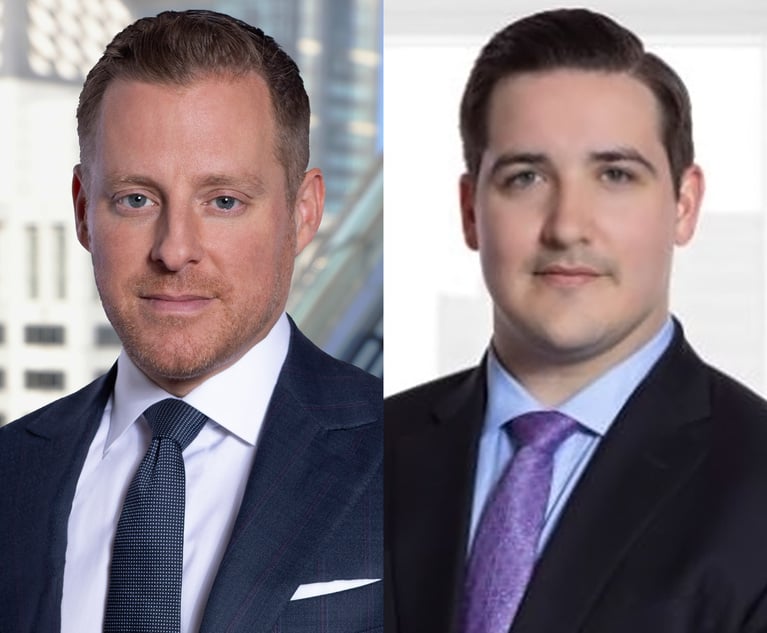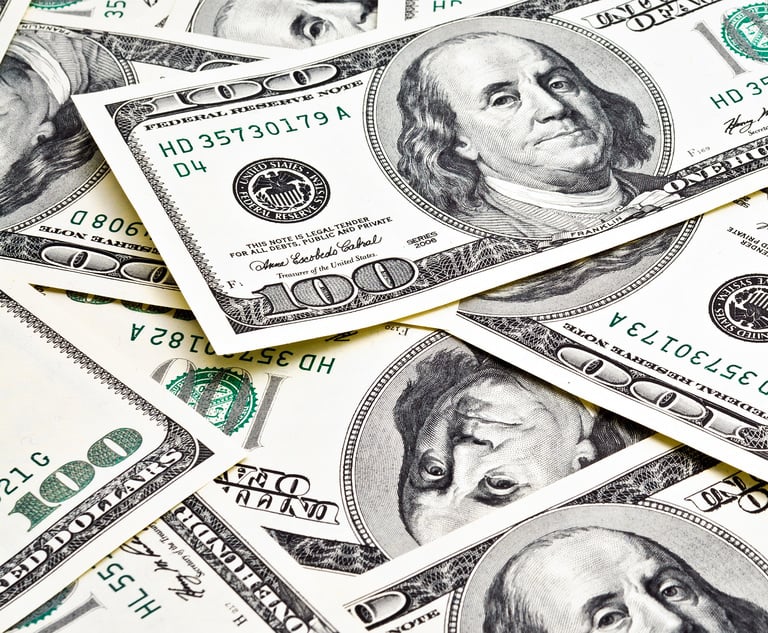 Greg Harvey, Montgomery McCracken
Greg Harvey, Montgomery McCrackenGregory Harvey, 'Dean' of Election Law, Dies at 81
"He was equal parts brilliant, hysterically funny, intellectually rigorous, wholly gregarious," according to one of his Montgomery McCracken Walker & Rhoads colleagues.
August 07, 2018 at 06:06 PM
5 minute read
Gregory Harvey, a well-known election and First Amendment law attorney, died Tuesday morning at the age of 81.
Several members of the Philadelphia legal community described Harvey, a longtime Montgomery McCracken Walker & Rhoads lawyer, as a trailblazer in the field of election law, an “encyclopedia” of knowledge about the city's political system and history, and as a friend and mentor.
“He was equal parts brilliant, hysterically funny, intellectually rigorous, wholly gregarious. He loved nothing better than telling stories, and half the stories he would start by saying, 'You can't tell anybody this,'” Montgomery McCracken attorney Jeremy Mishkin said. “His legacy as a Philadelphia lawyer, in the sense of being a zealous advocate for his client and at the same time, a genuinely intelligent and cultured citizen of the community, is a real standard that we can all aspire to.”
According to his firm bio, Harvey graduated from Harvard University in 1959, and earned his law degree from Harvard Law in 1962. He spent more than 30 years at Morgan, Lewis & Bockius before he joined Montgomery McCracken.
He focused on public election law, First Amendment law and securities litigation, often representing newspapers and publishers. According to his firm bio, his work led to more than 150 reported judicial decisions, and numerous awards including the James Madison Award from the Society of Professional Journalists.
Hank Grezlak, editor-in-chief of The Legal Intelligencer, said in an emailed statement that Harvey was a “longtime and valuable” member of the paper's editorial board, who “always demonstrated a strong sense of right and wrong, regardless of party affiliation or who was involved.”
“He was smart, funny, and incredibly knowledgeable, not just about Philadelphia politics, but all the connections between the legal and political communities,” Grezlak said. “I know whenever a reporter had a question on election law, we usually suggested reaching out to Greg. He will be very much missed.”
After news of his passing spread Tuesday, attorneys said they remembered him most as a leader in election law and as a mentor.
“He was the dean of election law in Pennsylvania,” said attorney Adam Bonin, who focuses on election law and considered Harvey a mentor. ”He was the model, both professionally and personally, of what we should all aspire to in terms of his knowledge of the rules and his desire to do good through representing candidates and entities that were going to make democracy better.”
Mark Sheppard of Montgomery McCracken, who said he worked on several cases with Harvey, said Harvey seemed happiest when he was mentoring younger attorneys.
“He was unfailingly courteous to everyone in his cases. Everyone. And he wouldn't countenance anything less from anyone else. There was no place for the acrimony and the 'gotcha' that sometimes goes on today,” Sheppard said. “I'm a better lawyer, and I think we all are, for having practiced with him.”
According to Morgan Lewis partner Marc Sonnenfeld, Harvey's first foray into election law came in 1964 when he represented Genevieve Blatt, the first woman to be elected to statewide office in Pennsylvania, during a lengthy recount as part of her ultimately unsuccessful bid for the U.S. Senate. Sonnenfeld said Harvey began at Morgan Lewis when his scheduled internship with Pennsylvania Justice Curtis Bok fell through after the justice passed away. Sonnenfeld said Harvey began mentoring him after he joined the firm in 1974.
“He had an infectious enthusiasm for the law,” Sonnenfeld said. “He loved being a lawyer.”
Sonnenfeld also noted that Harvey loved traveling with his wife, Emily Mitchell Wallace, with whom he was married for nearly 50 years.
During the years Harvey spent representing politicians and making legal challenges before the courts, he learned the city's political and legal secrets, several attorneys said, which, they added, made him the “go-to” person when it came to learning about the city's arcane election procedures and its history.
“He was the walking encyclopedia of both of those endeavors,” said Albert S. Dandridge III of Schnader Harrison Segal & Lewis. “He knew all the cases and about who did what, and why somebody went to jail, or why somebody didn't go to jail. He was an interesting person to listen to and a great person to refer clients to if they needed that information.”
Several attorneys also reminisced about his unique “drawl,” and fastidious sense of style.
“I would see him on the street, and you'd always know who he was. You would look up ahead of you and see this thin person in a seersucker suit with a wide brimmed hat on and you knew,” Dandridge said.
“They don't make them like that anymore,” Mishkin said. “With his bow ties and three-piece suits, it was a real piece of Philadelphia lawyer history being able to experience him.”
According to attorneys, that style was a big part of his success and will remain a piece of his legacy.
“One of the things I learned practicing with him was the importance of being precise, and taking the time to say exactly what it is you want to say,” Sheppard said. “Gregory was very deliberate in his speech and his demeanor. That was a big part of his success.”
This content has been archived. It is available through our partners, LexisNexis® and Bloomberg Law.
To view this content, please continue to their sites.
Not a Lexis Subscriber?
Subscribe Now
Not a Bloomberg Law Subscriber?
Subscribe Now
NOT FOR REPRINT
© 2025 ALM Global, LLC, All Rights Reserved. Request academic re-use from www.copyright.com. All other uses, submit a request to [email protected]. For more information visit Asset & Logo Licensing.
You Might Like
View All
Pa. Appeals Court: Trial Judge Dismissed Med Mal Claims Without Giving Plaintiffs Proper Time to Fight Back
4 minute read
Phila. Judge Upholds $68.5M Verdict Over Construction Worker's Death
3 minute read
Phila. Jury Awards $15M to Woman Who Slipped on Apartment Building Stairs
4 minute readTrending Stories
- 1The Fearless Forecaster’s Employment Law Predictions for 2025
- 2Judicial Conference Declines Democratic Request to Refer Justice Thomas to DOJ
- 3People in the News—Jan. 2, 2025—Eastburn and Gray, Klehr Harrison
- 4Deal Watch: Latham, Paul Weiss, Debevoise Land on Year-End Big Deals. Plus, Mixed Messages for 2025 M&A
- 5Bathroom Recording Leads to Lawyer's Disbarment: Disciplinary Roundup
Who Got The Work
Michael G. Bongiorno, Andrew Scott Dulberg and Elizabeth E. Driscoll from Wilmer Cutler Pickering Hale and Dorr have stepped in to represent Symbotic Inc., an A.I.-enabled technology platform that focuses on increasing supply chain efficiency, and other defendants in a pending shareholder derivative lawsuit. The case, filed Oct. 2 in Massachusetts District Court by the Brown Law Firm on behalf of Stephen Austen, accuses certain officers and directors of misleading investors in regard to Symbotic's potential for margin growth by failing to disclose that the company was not equipped to timely deploy its systems or manage expenses through project delays. The case, assigned to U.S. District Judge Nathaniel M. Gorton, is 1:24-cv-12522, Austen v. Cohen et al.
Who Got The Work
Edmund Polubinski and Marie Killmond of Davis Polk & Wardwell have entered appearances for data platform software development company MongoDB and other defendants in a pending shareholder derivative lawsuit. The action, filed Oct. 7 in New York Southern District Court by the Brown Law Firm, accuses the company's directors and/or officers of falsely expressing confidence in the company’s restructuring of its sales incentive plan and downplaying the severity of decreases in its upfront commitments. The case is 1:24-cv-07594, Roy v. Ittycheria et al.
Who Got The Work
Amy O. Bruchs and Kurt F. Ellison of Michael Best & Friedrich have entered appearances for Epic Systems Corp. in a pending employment discrimination lawsuit. The suit was filed Sept. 7 in Wisconsin Western District Court by Levine Eisberner LLC and Siri & Glimstad on behalf of a project manager who claims that he was wrongfully terminated after applying for a religious exemption to the defendant's COVID-19 vaccine mandate. The case, assigned to U.S. Magistrate Judge Anita Marie Boor, is 3:24-cv-00630, Secker, Nathan v. Epic Systems Corporation.
Who Got The Work
David X. Sullivan, Thomas J. Finn and Gregory A. Hall from McCarter & English have entered appearances for Sunrun Installation Services in a pending civil rights lawsuit. The complaint was filed Sept. 4 in Connecticut District Court by attorney Robert M. Berke on behalf of former employee George Edward Steins, who was arrested and charged with employing an unregistered home improvement salesperson. The complaint alleges that had Sunrun informed the Connecticut Department of Consumer Protection that the plaintiff's employment had ended in 2017 and that he no longer held Sunrun's home improvement contractor license, he would not have been hit with charges, which were dismissed in May 2024. The case, assigned to U.S. District Judge Jeffrey A. Meyer, is 3:24-cv-01423, Steins v. Sunrun, Inc. et al.
Who Got The Work
Greenberg Traurig shareholder Joshua L. Raskin has entered an appearance for boohoo.com UK Ltd. in a pending patent infringement lawsuit. The suit, filed Sept. 3 in Texas Eastern District Court by Rozier Hardt McDonough on behalf of Alto Dynamics, asserts five patents related to an online shopping platform. The case, assigned to U.S. District Judge Rodney Gilstrap, is 2:24-cv-00719, Alto Dynamics, LLC v. boohoo.com UK Limited.
Featured Firms
Law Offices of Gary Martin Hays & Associates, P.C.
(470) 294-1674
Law Offices of Mark E. Salomone
(857) 444-6468
Smith & Hassler
(713) 739-1250






